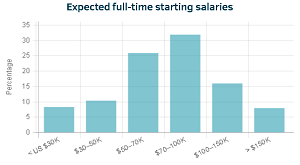News
Surveys Shed Light on New Developers Entering Workforce
- By David Ramel
- May 19, 2016
Two new surveys of recent graduates and students about to enter the developer workforce reveal lots of different opinions about their chosen vocations and one consensus conclusion: The developer hiring process is flawed.
The surveys come from Toptal, which matches up freelance developers with companies looking to hire, and Devpost, which drew upon its experience in running student hackathons for its Student Hacker Report - Spring 2016. Toptal surveyed recent college graduates, but didn't provide any survey methodology. Devpost garnered its data during the 2016 spring hackathon season, asking students several questions when they submitted hackathon projects. It ended up surveying more than 1,700 students attending 80 hackathons.
One common thread between the two surveys was the flawed hiring process, and Devpost said it hoped its study would help managers, recruiters and human resource departments become more productive and make better hires.
One way to do that is to address three key issues with recruiting identified by hackathon students:
- Difficulty finding desirable job opportunities due to lack of information.
- Job applications don't represent them effectively.
- Interviews are stressful and unproductive.
Interviewing was a sore spot among both camps of respondents.
"Interviews are a source of anxiety, likely due to irrelevant questions that don't reflect real life problem solving," Devpost said.
"Developers typically face two types of interviews: technical and behavioral," Devpost continued. "They can be live and in-person or remote via Skype/Hangouts. Technical interviews often include whiteboard problem solving, logic questions, pairing sessions, or even a take home exercise. Basically, there's no one-true-way to do interviews, but there does seem to be one-true-attitude toward them:
 The Attitude Toward Interviews (source: Devpost)
The Attitude Toward Interviews (source: Devpost)
Some 25 percent of Devpost's respondents reported behavioral and technical interviews were the worst part of the hiring process, with other negatives being:
- Irrelevant questions.
- Post interview suspense and waiting for response.
- Answering questions (technical, behavior, and any).
Furthermore, 65 percent of students surveyed by Devpost said they'd prefer a take-home coding project instead of a technical interview.
"Students said take-home projects are more representative of a real-world assignment, less stressful and allow them to focus," Devpost said. "Technical interview proponents preferred the social interaction and opportunity to demonstrate their problem solving skills in real-time."
Toptal, which surveyed recent graduates, said, "When it comes to the hiring and interview process, new grads most wish employers would: be more transparent about the hiring process and status of their application (48 percent), inform applicants as soon as possible if they do not get the position (46 percent) and disclose the salary range for the position (44 percent). 78 percent of recent grads say they prefer and in-person interview to a phone (40 percent), e-mail (22 percent) or Skype (22 percent) interview."
Other survey highlights listed by Toptal include:
- 50 percent would like to work from home.
- 37 percent said they most want to be able to use their degree and skill-set, regardless of salary or flexibility.
- 35 percent of new grads would like a traditional, 9-to-5 office job.
- 80 percent say they would like flexible hours, whether working at home or in an office.
- Twice as many say they'd prefer a salaried position (33 percent) to an hourly wage (16 percent).
Toptal said earch engines such as Monster, Craigslist and CareerBuilder were the primary method used by graduates to look for jobs (58 percent), followed by company Web sites (44 percent), job fairs, (32 percent), LinkedIn (32 percent) and social networks such as Facebook and Twitter (29 percent).
Devpost reported different findings about how students looked for jobs, with an unsurprising focus on hackathons. "While career fairs and word of mouth are the most popular ways that students look for jobs, hackathons are coming up fast," Devpost said. "Mid-size events can bring in 100–200 students. On the high end, PennApps and MHacks have gotten up to 1,400."
 [Click on image for larger view.]
Banking on Bank (source: Devpost)
[Click on image for larger view.]
Banking on Bank (source: Devpost)
The students surveyed by Devpost do expect pretty good salaries if they are hired, with the largest group of respondents expecting to make $70,000 to $100,000 right out of school, while expecting a $20,000 to $30,000 raise within their first five years.
"High earners, with starting salaries over $150,000, expect to jump at least $50,000," Devpost said. "A 40 percent jump over five years ($50k→$70K) may sound extreme outside the tech industry, but today's students are in high demand and their expectations reflect it."
Toptal provided further results from its recent graduate study. "As for which part of the job application process is most challenging, new grads say it's finding the right positions (41 percent) and making themselves stand out (43 percent); they believe employers are looking for experience (62 percent), confidence (50 percent) and education (50 percent)," the company said.
Devpost found that the factors most important when considering a job were people, learning, impact and culture.
"Developers care more about your team than your perks," said Devpost, providing more advice for prospective employers. "It's easy to fix a broken ping pong table, but it's not so easy to fix a broken development team. Additionally, many students said they believed people and culture are the same thing.
"Your developers are the best recruiting asset you've got. Get them involved and in front of developers whenever you can: career fairs, phone screens, interviews, conference talks, mentoring and so on."
About the Author
David Ramel is an editor and writer at Converge 360.